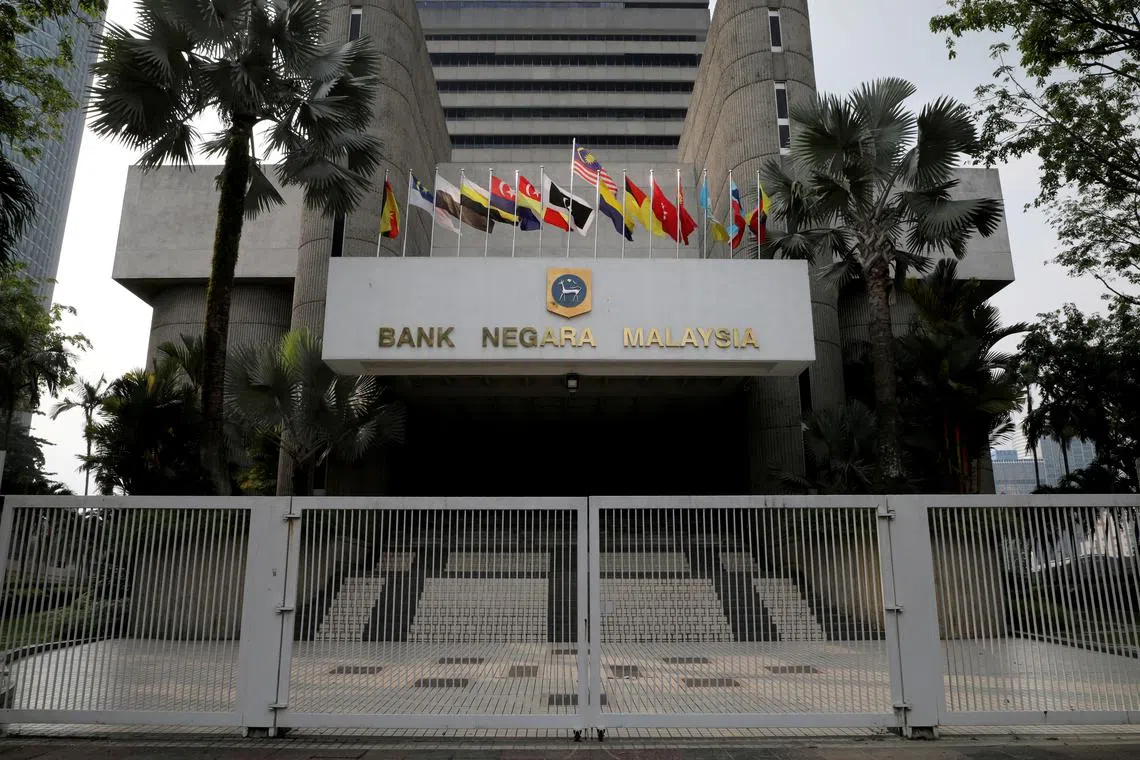Malaysia surprises with key rate hike as inflation risks loom
Sign up now: Get insights on the biggest stories in Malaysia

Bank Negara Malaysia unexpectedly hiked the overnight policy rate to 3 per cent.
PHOTO: REUTERS
KUALA LUMPUR – Malaysia unexpectedly raised its benchmark interest rate by a quarter point on Wednesday, as it seeks to pre-emptively ward off inflationary pressures amid strong domestic demand and looming subsidy cuts.
The central bank, Bank Negara Malaysia (BNM), hiked the overnight policy rate to 3 per cent, a move predicted by just three out of 19 economists in a Bloomberg survey.
The rest had expected the central bank to stay pat for a third straight meeting.
“The balance of risk to the inflation outlook is tilted to the upside and remains highly subject to any changes to domestic policy, including on subsidies and price controls, financial market developments, as well as global commodity prices,” the central bank said in a statement.
The benchmark local stock index’s losses narrowed to 0.3 per cent, while the ringgit gained 0.3 per cent against the US dollar after the surprise increase.
Malaysia’s two-year non-deliverable interest rate swaps rose 7 basis points to 3.45 per cent.
Wednesday’s move marks the return of borrowing costs to pre-pandemic levels by BNM after a brief pause in adjustments earlier this year.
The decision comes ahead of the government’s plans to cut diesel and petrol subsidies, which could potentially add to price pressures, and precedes the Federal Reserve’s meeting where United States central bankers are expected to move by a quarter point before standing pat for a while.
The central bank’s Monetary Policy Committee (MPC) judged that the economy had momentum, expecting expansion to be supported by domestic demand even as the global outlook darkened.
“In the light of the continued strength of the Malaysian economy, the MPC also recognises the need to ensure that the stance of monetary policy is appropriate to prevent the risk of future financial imbalances,” BNM said.
“The current policy settings are slightly accommodative and remain supportive of the economy,” the central bank added.
Malaysia’s March core inflation – which strips out volatile food and energy prices – remained sticky at 3.8 per cent,
“BNM has removed its pandemic stimulus, but still sees monetary policy as slightly stimulatory, that inflation risks are tilted to the upside and has added the concern about financial imbalances to its forward guidance,” said Mr David Forrester, an FX strategist at Credit Agricole CIB in Singapore.
“This rhetoric suggests BNM could be beginning a new phase of its tightening cycle.”
Still, others believe current economic conditions may force policymakers to pause.
“BNM will leave the OPR (overnight policy rate) unchanged for the rest of the year, in cognisance of a softer inflation outlook globally in the second half of 2023, an expected end to the global rate-hike cycle by mid-2023, and rising recession risks in advanced economies,” said Ms Julia Goh and Ms Loke Siew Ting of United Overseas Bank ahead of the decision.
The duo had correctly predicted Wednesday’s rate hike.
Malaysia is showing signs of wear from weakened global demand, with outbound shipments in March contracting for the first time in nearly three years.
While domestic household spending remains resilient and unemployment continues to decline, the central bank said downside risks to growth stem from weaker-than-expected global growth and more volatile global financial-market conditions.
“As the MPC still sees upside risk to inflation and a pre-emptive measure against the risk of future build-up of financial imbalances, we expect an extended pause ahead,” said Mr Winson Phoon, head of fixed-income research at Maybank Securities in Singapore. BLOOMBERG


